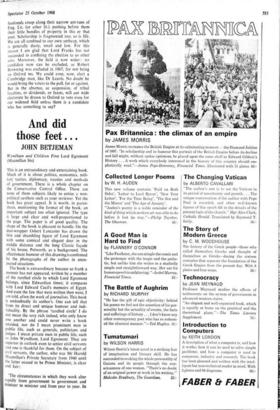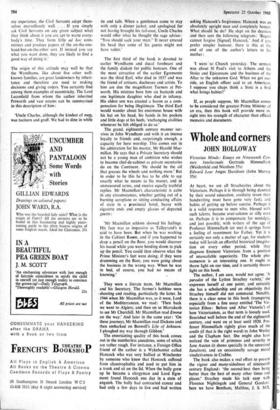And did those feet . . .
JOHN BETJEMAN
Wyndham and Children First Lord Egremont (Macmillan 36s)
This is an extraordinary and entertaining book. Much of it is about politics, economics, mili- tary tactics, diplomacy, treaties and methods of government. There is a whole chapter on the Conservative Central Office. These are none of them subjects likely to entice a non- political aesthete such as your reviewer. Yet the book has great appeal. It is worth, in paren- thesis, mentioning the format of the book, an important subject too often ignored. The type is large and clear and well-proportioned to the page. The paper is of good quality. The shape of the book is pleasant to handle. On the dust-wrapper Osbert Lancaster has drawn the thin and shambling figure of Lord Egremont with some comical and elegant deer in the middle distance and the long Classic facade of his house, Petworth, as a background. The affectionate humour of this drawing is confirmed by the photographs of the author in unex- pected situations.
The book is extraordinary because so frank a memoir has not appeared, written by a member of the rarefied circle to which Lord Egremont belongs, since Edwardian times; it compares with Lord Edward Cecil's memoirs of Egypt. And even the few that were written then were, I am told, often the work of journalists. This book is undoubtedly its author's. One can tell that from its direct and unique humour and indi- viduality. By the phrase 'rarefied circle' I do not mean the very rich indeed, who only know one another and could never write a book unaided, nor do I mean prominent men in public life, such as generals, politicians and judges. I mean private men in public life, such as John Wyndham, Lord Egremont. They are superior in outlook even to senior civil servants and one is thankful for them. On the subject of civil servants, the author, who was Mr Harold Macmillan's Private Secretary from 1940 until the latter ceased to be Prime Minister, is clear and fair :
'The circumstances in which they work alter rapidly from government to government and minister to minister and from year to year. In my experience, the Civil Servants adapt them- selves marvelously well. . . . If you simply ask Civil Servants on any given subject what they think about it you are apt to waste every- body's time. They form little ad hoc com- mittees and produce papers of the on-the-one- hand-but-on-the-other sort. If instead you say what you want done, they are likely to find a good way of doing it.'
The origin of this attitude may well be that the Wyndhams, like about five other well- known families, are great landowners by inheri- tance and therefore are used to making decisions and giving orders. You certainly find among them examples of eccentricity. The Lord Leconfield from whom the author inherited Petworth and vast estates can be summarised in this description of him: `Uncle Charles, although the kindest of mes, was taciturn and gruff. We had to dine in white tie and tails. When a gentleman came to stay with only a dinner jacket, and apologised for not having brought his tail-coat, Uncle Charles would offer what he thought the sage advice: "You should sack your man." It never entered his head that some of his. guests might not have valets.'
The first third of the book is devoted to earlier Wyndhams and ducal forebears and the family disdain for public honours. One of the most attractive of the earlier Egremonts was the third Earl, who died in 1837 and was the friend of artisans, duchesses and artists. To him are due the magnificent Turners at Pet- worth. His mistress bore him six bastards and one legitimate daughter who died in infancy. His eldest son was created a baron as a com- pensation for being illegitimate. The third Earl would wander about his enormous house with his hat on his head, his hands in his pockets and little dogs at his heels, 'exchanging civilities whenever he felt obliged to do so.'
The grand, eighteenth century manner sur- vives in John Wyndham and with it an intense loyalty to friends' and, surprisingly enough, a capacity for hero worship. This comes out in his admiration for his master, Mr Harold Mac- millan. He says that a Private Secretary should not be a young man of ambition who wishes to become chef-de-cabinet as private secretaries do on the Continent. 'He should be the oil that greases the wheels and nothing more.' But in order to be this he has to be able to say exactly what he means to his master, and in unmeasured terms, and receive equally truthful replies. Mr Macmillan's characteristic is calm in any circumstances, whether getting out of a burning aeroplane or sitting conducting affairs of state in a provincial hotel, heavy with cigarette ends and empty glasses of departed guests: `Mr Macmillan seldom showed his feelings. His face was as impassive' as Talleyrand's is said to have been. But when he was working in the Cabinet Room, and if you happened to drop a pencil on the floor, you would discover his mood while you were bending down to pick up the pencil. You could then observe what the Prime Minister's feet were doing; if they were drumming on the floor, you were going about the business in the wrong way. When he was in bed, of course, you had no means of knowing.'
They were a literate team, Mr Macmillan and his Secretary. The former's hobbies were - shooting and reading, particularly the latter. In • 1944 when Mr Macmillan was, as it were, Lord of the Mediterranean, we read: 'Then back we went to Algiers; and then on to Marrakesh to see Mr Churchill. Mr Macmillan read Emma on the way.' And later in the same year: 'On these journeys, Mr Macmillan read Dickens and then embarked on Boswell's Life of Johnson. I ploughed my way through Gibbon.'
The entertaining quality of this book comes out in the numberless anecdotes, some of which are rather rough. For instance, a Foreign Office friend of the author is a Wykehamist called Hancock who was very bullied at Winchester by someone who knew that Hancock suffered from claustrophobia and used to put him in a trunk and sit on the lid. When the bully grew up he became a clergyman and Lord Egre- mont found Hancock one day in a state of anguish. The bully had contracted cancer and had only a few days to live and had written asking Hancock's forgiveness. Hancock was an absolutely upright man and Completely honest. What should he do? He slept on his decision and then sent the following telegram: 'Regret cannot forgive [Signed] Hancock.' And if you prefer simpler humour, there is this at the end of one of the author's letters to his mother: `I went to Church yesterday. The sermon was about St Paul's visit to Athens and the Stoics and Epicureans and the business of the Altar to the unknown God. When we got out- side, an English officer said to an American, I suppose you chaps think a Stoic is a bird what brings babies?'
If, as people suppose, Mr Macmillan comes to be considered the greatest Prime Minister of an era, then this book will provide more in- sight into his strength of character than official memoirs and documents.















































 Previous page
Previous page